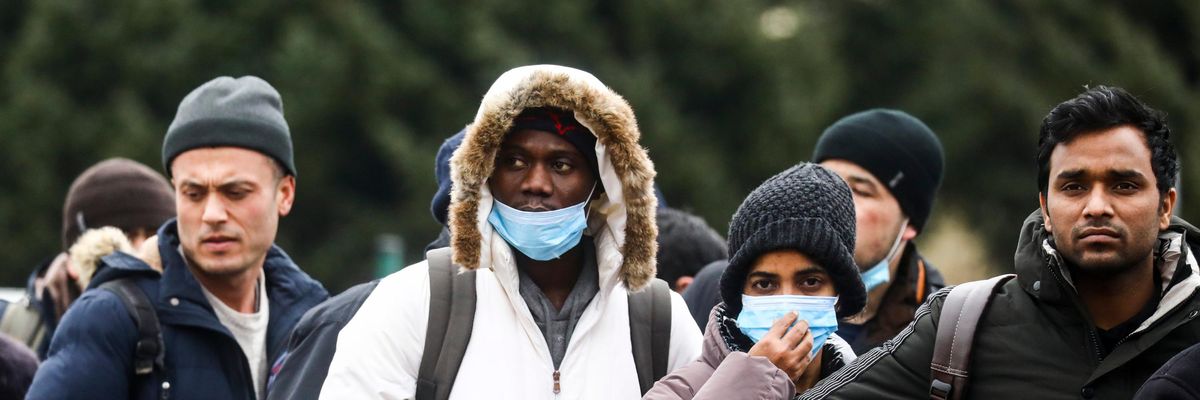In the weeks since Russian President Vladimir Putin initiated the invasion of Ukraine, Brown and Black people fleeing Ukraine continue to experience racism and violence, including in neighboring EU countries. Romanian police officers aggressively removed Ukrainian Roma women from refugee-dedicated rooms just recently. Polish police officers also pointed guns at African students. This war, a looming humanitarian catastrophe, has unleashed new, overt, and cruel manifestations of racism on the continent, revealing longstanding double standards at the global level.
This war, a looming humanitarian catastrophe, has unleashed new, overt, and cruel manifestations of racism on the continent, revealing longstanding double standards at the global level.
The Ukrainian humanitarian crisis has brought many extraordinary examples of global solidarity to light. Yet, journalists, politicians, non-profit organizations, and the international community keep signaling to the world that only attacks on white lives are attacks on humanity. A recent statement by former Deputy Prosecutor General of Ukraine David Sakvarelidze represents the beliefs and thoughts of many. "It's very emotional for me because I see European people with blue eyes and blond hair...being killed every day." This narrative reinforces an old civilized/barbaric stereotype, in which white European people are portrayed as inherently peaceful while African/Middle Eastern people are thought to be predisposed to conflict and war.
The people who left Ukraine made tremendous sacrifices by abandoning their homes, loved ones, colleges, and jobs to reach safety at the borders. But at the borders, people received different levels of support based on their perceived identities and value in society. Many African students report waiting at the Polish border for hours in freezing temperatures even as buses of white Ukrainians are allowed in. Even hotel rooms have been set aside exclusively for "Ukrainians."
The problem begins on the Ukrainian side where Ukrainian security officials filter the people allowed to board buses and trains to safety. Ukrainians are deemed worthy of occupying space in these transit vehicles, but African students and citizens face a barrier due to generations of racist ideologies.
Many Nigerian citizens remain trapped in Ukraine because they are not permitted to enter countries that opened their doors to people fleeing from Russian violence. Not only are these people experiencing the trauma of evacuating a war zone, but they are also experiencing physical and verbal assault by border guards. Videos and first-hand accounts from African students depict the discrimination and overt racism they are experiencing as they try to reach safety.
On February 27, Nigerian President Muhammadu Buhari issued a press release declaring that "All who flee a conflict situation have the same right to safe passage under U.N. Convention and the colour of their passport or their skin should make no difference." Nevertheless, this is not the case for Nigerian citizens. On March 2, Buhari approved a provision to allocate $8.5 million to assist the evacuation of Nigerian citizens.
The message that European countries have been delivering for years is that they have the power and willingness to open their doors to refugees, but only if those refugees look like "Europeans."
The message that European countries have been delivering for years is that they have the power and willingness to open their doors to refugees, but only if those refugees look like "Europeans." On February 24, Polish Interior Minister Mariusz Kaminski stated, "Anyone fleeing from bombs, from Russian rifles, can count on the support of the Polish state." However, less than a month ago, in January 2022, the same administration was willing to spend 353 million euros to build a wall to keep out refugees from Syria, Iraqi Kurdistan, and Afghanistan.
The same holds true for Hungary, which has welcomed over 255,000 Ukrainians. This is the same country that built an electric razor-wire fence to keep refugees out of their country. In 2017, Prime Minister Viktor Orban described refugees seeking safety, from Africa and the Middle East, as a "threat to the European way of life." Humanitarian crises in these countries are not much different from Ukraine's. People are dying from war, starvation, and lack of necessities, yet these conditions are normalized and expected in countries of color.
Ukraine deserves and needs the international support, solidarity, and aid it is currently receiving. This sets a standard for how humanitarian measures and assistance should be implemented in other parts of the world, including Yemen, Syria, Afghanistan, Somalia, the Democratic Republic of Congo, South Sudan, Iran, or Venezuela. We need to stop normalizing humanitarian crises in other countries, including but not limited to the Middle East and Latin America.
We stand in solidarity with the Ukrainian people as they experience immense trauma during wartime and are forced to abandon their homes and loved ones. And we also demand similar responses and protection when people of color are the victims of wars. The mobilization of resources and the open-door policy of Ukraine's neighbor offer just such a united approach in the face of crisis.
This is not the first humanitarian crisis, and it will not be the last. We have the power, structures, and skills to aid all countries when such issues arise. Instead of building walls to keep people out, we need to address the underlying systems forcing people to flee their homelands. And the international community needs to prove to the world that melanin is not the ingredient that determines whether their lives are worth saving.
